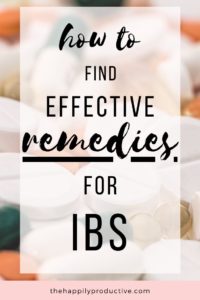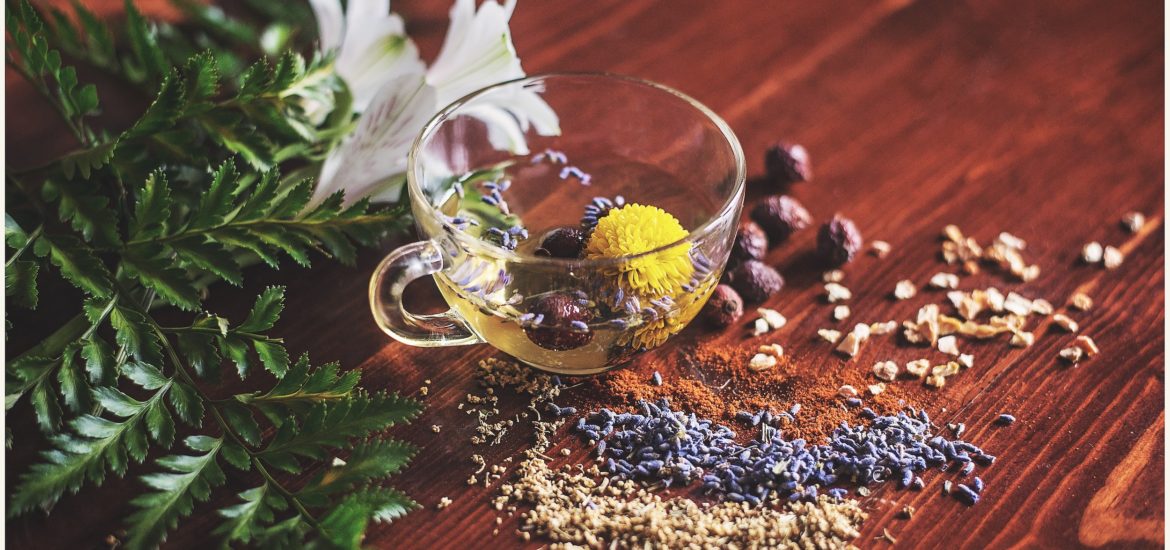Wouldn’t it be great if you could simply take a pill and your IBS would be gone? I bet it’s every IBS sufferers dream, deep down. But unfortunately, there are no “cure-it-all” remedies for IBS. And dealing with Irritable Bowel Syndrome is much more complicated than that.
In my previous IBS-related posts about working with IBS, living with IBS or even foods that work with IBS, a lot of people commented that they relied on medication to relieve their symptoms. Or that they were still looking for the right remedies to manage IBS. And that inspired me to write this article.
I’m obviously not a doctor or any health professional at all, so I can’t tell you anything scientific about remedies for IBS. However, I am an IBS sufferer myself who has taken tons and tons of different pills to try and manage my IBS-D symptoms. So, here’s my experience with that.
Medication for IBS (and why doctors aren’t always helpful)
I’ve seen about 5 different doctors before and during my IBS diagnosis. I did tons of tests, was transferred from my doctor to a specialist, and then other specialists…
The problem was that most doctors didn’t even listen. All tests came back negative, so I obviously wasn’t sick. And thus, it was all just in my head.
Although no one seemed to take my symptoms seriously, they were pretty quick to prescribe medication for my IBS.
Each doctor made me take a new pill. I tried it for a while, and nothing happened. None of the drugs they gave me did anything to help with IBS symptoms!
At one point, they ran out of ideas. That’s when they definitely agreed that it was all in my head and I didn’t need any help.
Weirdly enough, things got better after that. Because I stopped looking for some miracle IBS remedy and started focusing on my IBS diet and lifestyle instead.
If you’re frustrated because your doctors can’t help you or don’t take you seriously, you’re not alone. And it’s not the end of the world. You can get pretty effective IBS relief by doing research on your own, whether it’s with natural remedies or diet and lifestyle changes. Preferably both.
Physical therapy for IBS
Osteopathy is a pretty common practice in France and one that was recommended to try and make my IBS symptoms go away. I don’t remember who recommended it – a doctor or the internet – but anyway, I tried.
Supposedly, an osteopath would be able to replace my intestines. It is because IBS might be triggered by your bowels being out of place… Even though I was sceptical, I was willing to try anything to cure my IBS. So, I made an appointment.
The treatment was long, painful and expensive. I went about three or four times, and nothing changed. At all. Except that my stomach hurt a lot from all the poking and whatever the guy did!
I’m not saying that he did a bad job or that this type of treatment can’t work. But it didn’t for me.
Please let me know if you’ve done any physical therapy for IBS and if it helped! I’d love to know.
Natural remedies for IBS
At one point, I was prescribed a bunch of natural remedies for my IBS.
I don’t quite remember what was inside these remedies, except turmeric. I also remember spending around 100 € on them and that they didn’t work whatsoever.
Maybe there are natural capsules or powders that really do help IBS in some cases. (Actually, I’ve since then discovered that herbs can be great for IBS). But the ones I tried didn’t help me.
What does help me though is using ginger to reduce IBS symptoms. Fresh ginger or even sushi ginger that you can buy at the supermarket. Or ginger tee, although I don’t like the taste of that for some reason. Ginger soothes my IBS and makes me less likely to get a flare-up if I add it to my meals.
Another natural remedy I like is Iberogast. It’s an herbal mixture that helps with mild symptoms and digestion in general. However, it’s not strong enough to treat an IBS attack.
If you want to try natural remedies for IBS, do your research first (you can start here, here and here). Find out how different substances are supposed to help. Then, look up testimonies online to see if they really have an effect.
Otherwise, you might end up spending a lot of money on something that is not a real cure for IBS!
Probiotics for IBS
The first doctor I saw prescribed me probiotics for my IBS. He didn’t explain what they were and how they worked. And when I told him, two weeks later, that I didn’t see any improvement, he suggested that I could stop taking them
Now, I’m still no expert on probiotics (but you can learn more about probiotics for IBS here). However, my personal experience taught me one thing: they take more than two weeks to show any effects
Once I had stopped relying on doctors and started doing research on my own, I found that a lot of people relied on probiotics to reduce their IBS symptoms.
In the end, I ordered some from Amazon that had good reviews. And I took them for 6 months.
Now, the problem with probiotics is that you might at first feel like they’re not doing anything. Until you stop taking them and see that they did help after all.
Probiotics can reduce the intensity of your IBS symptoms. Less severe flare-ups, milder symptoms day to day, and a bit more control over your body.
Probiotics are not some magic remedy for IBS, but if you haven’t tried them yet, I highly suggest that you do!
Imodium for IBS
One of the most used remedies for IBS-D seems to be Imodium. It helps with diarrhoea (more or less) and can give you the security that you won’t be looking for a bathroom anytime soon. Well, theoretically.
I’ve been through a phase where I took Imodium multiple times a week. Up to the maximum allowed dosage. And I wouldn’t recommend you do that.
First of all, I’ve read lots of comments saying that they take 20 Imodium tablets a day. Please, please check with your doctor to make sure that you don’t take too much of it!
The truth is, NO appointment nor work is worth risking your health for. If you feel like you can’t stay at your current job because of IBS, you don’t have to. I couldn’t, and so I became self-employed and started working from home. It’s hard, but possible!
Furthermore, for me, Imodium created a kind of vicious cycle. For one, it would start working after several hours only. I would take one, have to use the bathroom again, take another one, and so on. This could go on for several hours until I finally got better. Now I’m thinking that my IBS flare-up was probably naturally over once it finally “worked”.
The effects of Imodium on my IBS stayed for around 36 hours. I felt like it slowed down my digestion quite a bit, which could sometimes leave me bloated. Then, my IBS flare-up began again. And so, I had to take Imodium again.
Basically, instead of allowing my gut to regulate its digestion, Imodium made it jump between diarrhoea and constipation over and over again. I’m not sure how scientifically accurate that is, but that’s how it felt. In the end, I was better off not taking it and treating my IBS flare with tea, a heating pad and maybe a sick leave.
Once I stopped taking Imodium so often, my IBS attacks became less frequent. I still take some once in a while, especially before trips when my IBS is triggered by nervousness. But I always make sure that I don’t rely on it too often!
Conclusion: the truth about dealing with IBS
Maybe you were reading this article about effective remedies for IBS because you hoped to find that magic pill. I’m sorry, but that doesn’t seem to exist.
If you’re dealing with IBS and have not tried taking anything yet, start by figuring out some IBS relief with your doctor. It might help, but it might not.
And if you feel like you tried every IBS medication under the sun, welcome to the club. The good news is, there are tons of ways to help IBS that are not drugs.
Educate yourself on the right routine for IBS, what to eat with IBS, and how to cope with IBS at work and in life.

And please leave your experience with medication and remedies for IBS in the comments below! The illness is different for everyone, and your experience might be completely different than mine.


My experience is same as yours. Tons of doctors, zero help. I got a relief when I downloaded the Monash university app that guide you on what foods to eat and what foods to avoid. Basically I followed a low fodmap diet using the app. I no longer have permanent bloating, but I have permanent stomach distention that worsens as the day goes by. But at least the feeling of bloating is gone for most of the time. My diet is very restricted because I fear testing new foods, but I take multi vitamins everyday to try to balance it. I have same experience with pro-biotics, you think they don’t do anything until you stop taking them and see they at least accounted for some relief. No pill or medicine worked ever for me. The best you can do is a low fodmap diet, exercising and maybe some pro-biotics. Exercising helps push the air out your belly. If bloated, if I hit the gym and spend like 30 minutes really training hard I come back relieved, I actually burb during the exercise, that shows me air is trapped in my belly and my body fails to regulate it naturally. For people who take an energy drink once in a while, try redbull no sugar option, all thr other energy drinks bloated my stomach even when they were sugar free.
I’m so sorry that you’ve been going through all that as well. It’s good that the Low FODMAP diet helped you get rid of the bloating and I really feel your anxiety about trying new foods… I basically lived on 5 safe foods for years. Have you ever tried cutting out gluten? This is what helped me in re-introduce lots of other foods without feeling bloated all the time. I’ve heard from others who had the same effect with dairy, fructose, or caffeine. But those might obviously just as well be fine for you, we’re all different…
I use the medication called Ibsolution. It works as best as any herbal supplement
What about travel? My boyfriend wants to travel to Europe, specifically Italy and Greece. I am nervous as I hear the bathrooms aren’t plentiful and also you need to look hard to one and then you need to pay to use.
I’m glad the IBSolution works for you!
As for travelling, I agree that public bathrooms aren’t the best in Europe… it really depends on the city though. In my experience, touristy places often have public bathrooms, otherwise you can always walk into a hotel, cafe or restaurant and ask to use their bathroom, although they do often make you pay for that.
Have you talked to your boyfriend about this potential issue and also where you would eat so you could have your safe foods?
If you’re interested, I had written this post about travelling: https://thehappilyproductive.com/travelling-with-ibs/. The best and least stressful travel experience I’ve had was when my then boyfriend and I rented an RV. It was so nice to always have a bathroom available.